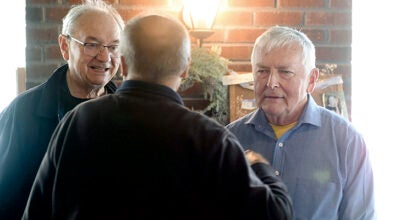Hormel Institute welcomes new section leaders
Published 7:27 am Friday, March 5, 2010
The Hormel Institute continues to add lab leaders since the institute’s expansion was completed in 2008, and two new section leaders have started since the first of the year.
With the addition of two positions, the number of new section leaders since the institute’s expansion has increased to five. There are now 11 individual lab leaders conducting cancer research at the Hormel Institute.
The Hormel Institute promised they’d add 100 new jobs to the community within five years of the completion of the institute’s expansion. About 60 people were employed at the institute in 2006, and that number has increased to about 115 since the expansion, according to Gail Dennison, director of public relations and development. She said they’re ahead of schedule.
Dr. Mohammad Saleem Bhat started Feb. 1 as section leader of the Molecular Chemoprevention and Therapeutics lab. Bhat’s research primarily focuses on pancreatic cancer and prostate cancer, and he’s also studying skin cancer.
Bhat is continuing research he started at the University of Wisconsin. He said he was drawn to the Hormel Institute because of the quality of researchers at the location, and he felt his goals matched the goals of the Hormel Institute.
“I wanted to go to an institute where I’d have freedom of work, and I’ve found freedom of work here,” Bhat said.
Bhat’s research focuses on non-toxic agents that target cancer cells to be used to treat cancer: “My work is to identify such agents,” Bhat said.
Bhat is working to develop such non-toxic agents as an alternative treatment other than chemotherapy, which can also damage health cells. Bhat is studying agents that will target cancerous cells and not healthy cells. One key place such agents are found is in foods, particulary fruits and vegetables.
These agents could be used in treatments to target people at risk of contracting cancer to prevent the disease or delay it to prolong a patient’s quality of life.
“Cancer development is delayed by five to 10 years,” he said. “It means if the disease occurs — if it occurs — it will start 10 years from now.”
One non-toxic agent Bhat will focus his research on is lupeol, which is found in foods like olive oil, strawberries and other fruits.
“When we tested it, we saw that it selectively killed prostate cancer cells … and spares normal cells — no effect on normal cells,” he said.
Bhat has published articles on his study of lupeol, and is continuing his research on the agent at the Hormel Instutute.
Lupeol was also used to test skin cancer levels in mice, and Bhat said mice treated with lupeol showed close to 70 percent lower cancer levels. Lupeol was also found to decrease the size of cancerous tumors in mice.
Since moving his research to the Hormel Institute, Bhat has hired two researchers, and he is planning to hire more employees in the near future. Bhat’s research is being funded through agencies like the National Cancer Institute and the Department of Defense. He’s also planning to apply for another grant soon and hopes to kick off an even larger project.
Bhat is collaborating with other researchers around the world. He recently formed a clinical partnership, which he said is very important in advancing cancer research.
Dr. Peiwen Fei started at the institute Wednesday as the an assistant professor, and she’ll head the Tumor Suppressors & Cancer Susceptibility Syndrome lab.
Fei came to the Hormel Institute from the Mayo Clinic Cancer Center, and she’ll continue the work she began there. Fei is studying cancer diagnosis and treatments.
Fei’s research, like all lab leaders, is funded through grants, and she said it’s beneficial that at the Hormel Institute she has a great deal of control over how the funding from her grants is used. For example, Fei — like all the section leaders — has control to hire her staff; however, grants are monitored by organizations like the National Institute of Health.
Fei described the Hormel Institute as a peaceful and quiet place to do her research. Fei said she liked that the Hormel Institute focuses entirely on research.
Since the Hormel Institute is located in a small town, Dennison said there are fewer distractions than there would be on the University of Minnesota campus, for example.
Fei and Bhat aren’t the only section leaders to join the institute in the last year, as Dr. Yibin Deng joined the institute in May 2009. Other recent hires include Rebecca Morris and Ted Hinchcliffe.
Bhat described the section leaders and researchers at the Hormel Institute as a box of jewels, but he hopes his jewel shines the brightest.
“This one diamond — Molecular Chemoprevention and Therapeutics — should shine when the box of jewels is opened,” he said.





